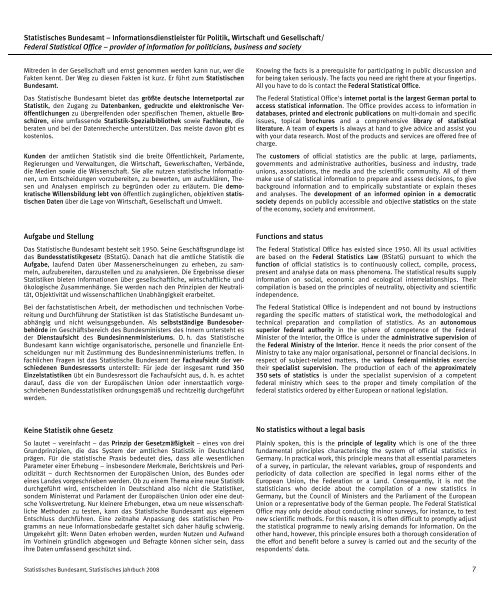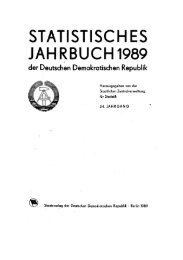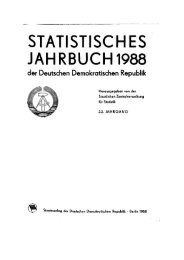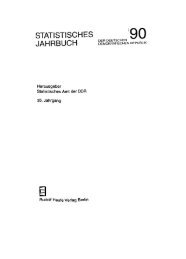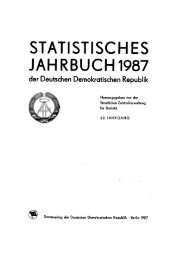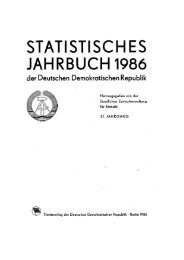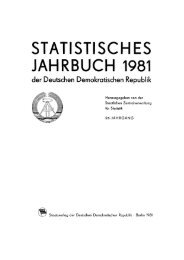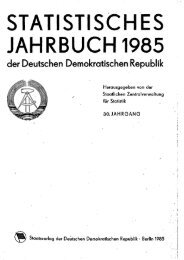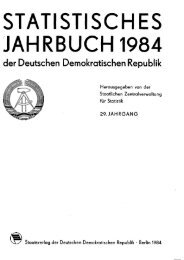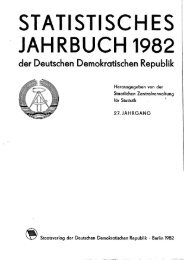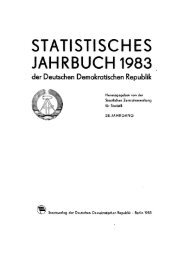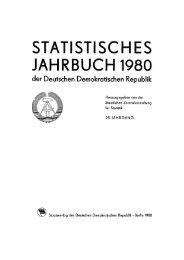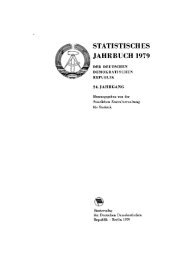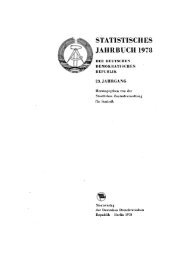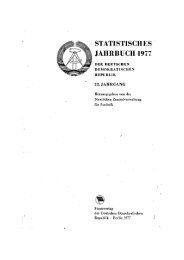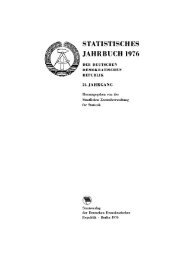- Seite 1 und 2: STATISTISCHES JAHRBUCH 2008 Für di
- Seite 3 und 4: Vorwort Liebe Leserin, lieber Leser
- Seite 5: Inhalt/Contents Einführung/Introdu
- Seite 9 und 10: Statistisches Bundesamt - Informati
- Seite 11 und 12: Informationsangebot des Statistisch
- Seite 13 und 14: Inhalt, Aufbau und Gebrauch des Sta
- Seite 15 und 16: Inhalt, Aufbau und Gebrauch des Sta
- Seite 17 und 18: Inhalt, Aufbau und Gebrauch des Sta
- Seite 19 und 20: Bundesrepublik Deutschland Dänemar
- Seite 21 und 22: 1 Geographie und Klima 1.1 Äußers
- Seite 23 und 24: 1 Geographie und Klima 1.5 Schiffba
- Seite 25 und 26: 1 Geographie und Klima 1.9 Ausgewä
- Seite 27 und 28: 2 Bevölkerung Erster Überblick .
- Seite 29 und 30: 2 Bevölkerung Kennzahlen nach Län
- Seite 31 und 32: 2 Bevölkerung Methodische Erläute
- Seite 33 und 34: 2 Bevölkerung Definitionen Haushal
- Seite 35 und 36: 2 Bevölkerung 2.1 Bevölkerungsent
- Seite 37 und 38: 2 Bevölkerung Altersaufbau und Mig
- Seite 39 und 40: 2 Bevölkerung 2.5 Bevölkerung der
- Seite 41 und 42: 2 Bevölkerung 2.6 Gemeinden und Be
- Seite 43 und 44: 2 Bevölkerung 2.9 Bevölkerung am
- Seite 45 und 46: 2 Bevölkerung 2.12 Privathaushalte
- Seite 47 und 48: 2 Bevölkerung 2.17 Ausländische B
- Seite 49 und 50: 2 Bevölkerung 2.20 Eheschließunge
- Seite 51 und 52: 2 Bevölkerung 2.22 Durchschnittlic
- Seite 53 und 54: 2 Bevölkerung 2.26 Sterbetafeln in
- Seite 55 und 56: 2 Bevölkerung 2.28 Gestorbene Säu
- Seite 57 und 58:
2 Bevölkerung 2.32 Wanderungen zwi
- Seite 59 und 60:
2 Bevölkerung 2.33 Wanderungen inn
- Seite 61 und 62:
2 Bevölkerung Bevölkerungszunahme
- Seite 63 und 64:
2 Bevölkerung 2.37 Bevölkerung mi
- Seite 65 und 66:
2 Bevölkerung 2.38 Evangelische Ki
- Seite 67 und 68:
2 Bevölkerung 2.40 Kirchentage 2.4
- Seite 69 und 70:
3 Arbeitsmarkt Erster Überblick .
- Seite 71 und 72:
3 Arbeitsmarkt Kennzahlen 2007 nach
- Seite 73 und 74:
3 Arbeitsmarkt Methodische Erläute
- Seite 75 und 76:
3 Arbeitsmarkt Methodische Erläute
- Seite 77 und 78:
3 Arbeitsmarkt Definitionen Erwerbs
- Seite 79 und 80:
3 Arbeitsmarkt 3.2 Erwerbstätige i
- Seite 81 und 82:
3 Arbeitsmarkt Entwicklung der Erwe
- Seite 83 und 84:
3 Arbeitsmarkt 3.5 Geleistete Arbei
- Seite 85 und 86:
3 Arbeitsmarkt 3.7 Bevölkerung 200
- Seite 87 und 88:
3 Arbeitsmarkt 3.11 Sozialversicher
- Seite 89 und 90:
3 Arbeitsmarkt 3.13 Sozialversicher
- Seite 91 und 92:
3 Arbeitsmarkt Bevölkerung 2006 na
- Seite 93 und 94:
3 Arbeitsmarkt 3.16 Sozialversicher
- Seite 95 und 96:
3 Arbeitsmarkt Publikationen und Au
- Seite 97 und 98:
4 Wahlen Kennzahlen 2005 nach Länd
- Seite 99 und 100:
4 Wahlen Definitionen Das Europäis
- Seite 101 und 102:
4 Wahlen 4.2 Wahlbeteiligung und St
- Seite 103 und 104:
4 Wahlen 4.3 Wahlen zum Deutschen B
- Seite 105 und 106:
4 Wahlen 4.5 Wahlberechtigte, Wähl
- Seite 107 und 108:
4 Wahlen 4.7 Landtagswahlen Land Da
- Seite 109 und 110:
4 Wahlen 4.11 Rechtsvorschriften de
- Seite 111 und 112:
5 Informationsgesellschaft Erster
- Seite 113 und 114:
5 Informationsgesellschaft Methodis
- Seite 115 und 116:
5 Informationsgesellschaft 5.1 Priv
- Seite 117 und 118:
5 Informationsgesellschaft PC-Nutzu
- Seite 119 und 120:
5 Informationsgesellschaft 5.7 Unte
- Seite 121 und 122:
5 Informationsgesellschaft 5.11 Unt
- Seite 123 und 124:
5 Informationsgesellschaft Publikat
- Seite 125 und 126:
6 Bildung und Wissenschaft Kennzahl
- Seite 127 und 128:
6 Bildung und Wissenschaft Methodis
- Seite 129 und 130:
6 Bildung und Wissenschaft Definiti
- Seite 131 und 132:
6 Bildung und Wissenschaft 6.1 Bev
- Seite 133 und 134:
6 Bildung und Wissenschaft 6.2 Allg
- Seite 135 und 136:
6 Bildung und Wissenschaft 6.3 Beru
- Seite 137 und 138:
6 Bildung und Wissenschaft 6.3 Beru
- Seite 139 und 140:
6 Bildung und Wissenschaft 6.4 Ausz
- Seite 141 und 142:
6 Bildung und Wissenschaft 6.5 Hoch
- Seite 143 und 144:
6 Bildung und Wissenschaft 6.5 Hoch
- Seite 145 und 146:
6 Bildung und Wissenschaft 6.5 Hoch
- Seite 147 und 148:
6 Bildung und Wissenschaft Frauen-
- Seite 149 und 150:
6 Bildung und Wissenschaft 6.5 Hoch
- Seite 151 und 152:
6 Bildung und Wissenschaft 6.5 Hoch
- Seite 153 und 154:
6 Bildung und Wissenschaft 6.6 Beru
- Seite 155 und 156:
6 Bildung und Wissenschaft 6.8 Teil
- Seite 157 und 158:
6 Bildung und Wissenschaft 6.11 Aus
- Seite 159 und 160:
6 Bildung und Wissenschaft 6.12 Bud
- Seite 161 und 162:
6 Bildung und Wissenschaft 6.14 Mon
- Seite 163 und 164:
6 Bildung und Wissenschaft 6.15 For
- Seite 165 und 166:
6 Bildung und Wissenschaft 6.18 Gef
- Seite 167 und 168:
6 Bildung und Wissenschaft Publikat
- Seite 169 und 170:
7 Kultur, Freizeit, Sport Kennzahle
- Seite 171 und 172:
7 Kultur, Freizeit, Sport Definitio
- Seite 173 und 174:
7 Kultur, Freizeit, Sport 7.1 UNESC
- Seite 175 und 176:
7 Kultur, Freizeit, Sport 7.3 Staat
- Seite 177 und 178:
7 Kultur, Freizeit, Sport 7.5 Buchp
- Seite 179 und 180:
7 Kultur, Freizeit, Sport 7.7 Musik
- Seite 181 und 182:
7 Kultur, Freizeit, Sport 7.10 Hör
- Seite 183 und 184:
7 Kultur, Freizeit, Sport 7.12 Hör
- Seite 185 und 186:
7 Kultur, Freizeit, Sport 7.15 Zeit
- Seite 187 und 188:
7 Kultur, Freizeit, Sport Museen na
- Seite 189 und 190:
7 Kultur, Freizeit, Sport 7.19 Deut
- Seite 191 und 192:
7 Kultur, Freizeit, Sport 7.22 Deut
- Seite 193 und 194:
8 Sozialleistungen Erster Überblic
- Seite 195 und 196:
8 Sozialleistungen Methodische Erl
- Seite 197 und 198:
8 Sozialleistungen Definitionen Die
- Seite 199 und 200:
8 Sozialleistungen Definitionen sch
- Seite 201 und 202:
8 Sozialleistungen 8.1 Sozialbudget
- Seite 203 und 204:
8 Sozialleistungen 8.2 Gesetzliche
- Seite 205 und 206:
8 Sozialleistungen 8.3 Gesetzliche
- Seite 207 und 208:
1 ) Ohne ruhende Renten. Quelle: Bu
- Seite 209 und 210:
8 Sozialleistungen 8.4 Gesetzliche
- Seite 211 und 212:
8 Sozialleistungen 8.7 Pflege im Ra
- Seite 213 und 214:
8 Sozialleistungen Ausgaben der ges
- Seite 215 und 216:
8 Sozialleistungen 8.10 Kindergeld
- Seite 217 und 218:
8 Sozialleistungen 8.14 Sozialhilfe
- Seite 219 und 220:
8 Sozialleistungen 8.15 Leistungen
- Seite 221 und 222:
8 Sozialleistungen 8.16 Kinder- und
- Seite 223 und 224:
8 Sozialleistungen 8.16 Kinder- und
- Seite 225 und 226:
8 Sozialleistungen Sozialhilfeausga
- Seite 227 und 228:
8 Sozialleistungen 8.16 Kinder- und
- Seite 229 und 230:
8 Sozialleistungen 8.16 Kinder- und
- Seite 231 und 232:
8 Sozialleistungen 8.16 Kinder- und
- Seite 233 und 234:
8 Sozialleistungen 8.18 Wohngeld 8.
- Seite 235 und 236:
8 Sozialleistungen Publikationen un
- Seite 237 und 238:
9 Gesundheitswesen Kennzahlen im Ze
- Seite 239 und 240:
9 Gesundheitswesen Methodische Erl
- Seite 241 und 242:
9 Gesundheitswesen Definitionen Gru
- Seite 243 und 244:
9 Gesundheitswesen Kosten der Krank
- Seite 245 und 246:
9 Gesundheitswesen 9.1 Gesundheitsz
- Seite 247 und 248:
9 Gesundheitswesen 9.2 Sterbefälle
- Seite 249 und 250:
9 Gesundheitswesen 9.3 Schwangersch
- Seite 251 und 252:
9 Gesundheitswesen 9.4 Krankenhäus
- Seite 253 und 254:
9 Gesundheitswesen Die zehn häufig
- Seite 255 und 256:
9 Gesundheitswesen 9.6 Gesundheitsa
- Seite 257 und 258:
9 Gesundheitswesen 9.7 Gesundheitsp
- Seite 259 und 260:
9 Gesundheitswesen 9.8 Direkte Kran
- Seite 261 und 262:
9 Gesundheitswesen Publikationen un
- Seite 263 und 264:
10 Justiz Wegen Verbrechen und Verg
- Seite 265 und 266:
10 Justiz Definitionen Abgeurteilte
- Seite 267 und 268:
10 Justiz 10.4 Geschäftsabwicklung
- Seite 269 und 270:
10 Justiz 10.4 Geschäftsabwicklung
- Seite 271 und 272:
10 Justiz 10.6 Straftaten und poliz
- Seite 273 und 274:
10 Justiz Wegen Verbrechen und Verg
- Seite 275 und 276:
10 Justiz 10.10 Wegen Vergehen im S
- Seite 277 und 278:
10 Justiz 10.16 Belegungsfähigkeit
- Seite 279 und 280:
10 Justiz Publikationen und Auskün
- Seite 281 und 282:
11 Bauen und Wohnen Kennzahlen im Z
- Seite 283 und 284:
11 Bauen und Wohnen Definitionen Di
- Seite 285 und 286:
11 Bauen und Wohnen 11.2 Baufertigs
- Seite 287 und 288:
11 Bauen und Wohnen Struktur des Wo
- Seite 289 und 290:
11 Bauen und Wohnen 11.4 Bestand an
- Seite 291 und 292:
11 Bauen und Wohnen 11.7 Bewohnte W
- Seite 293 und 294:
11 Bauen und Wohnen 11.10 Hauptmiet
- Seite 295 und 296:
12 Umwelt Erster Überblick . .....
- Seite 297 und 298:
12 Umwelt Methodische Erläuterunge
- Seite 299 und 300:
12 Umwelt Methodische Erläuterunge
- Seite 301 und 302:
12 Umwelt Definitionen Letztverbrau
- Seite 303 und 304:
12 Umwelt 12.2 Waren, Bau- und Dien
- Seite 305 und 306:
12 Umwelt 12.3 Wasserversorgung und
- Seite 307 und 308:
12 Umwelt 12.4 Unfälle mit wasserg
- Seite 309 und 310:
12 Umwelt Investitionen für Umwelt
- Seite 311 und 312:
12 Umwelt 12.6 Verwendung bestimmte
- Seite 313 und 314:
12 Umwelt 12.7 Material- und Energi
- Seite 315 und 316:
12 Umwelt 12.9 Verwendung von Energ
- Seite 317 und 318:
12 Umwelt 12.10 Luftemissionen 2005
- Seite 319 und 320:
12 Umwelt 12.12 Produktion, Ein- un
- Seite 321 und 322:
12 Umwelt Entnahmen und Abgaben von
- Seite 323 und 324:
12 Umwelt 12.16 Waldschäden 12.16.
- Seite 325 und 326:
12 Umwelt 12.17 Ausgaben und Aufwen
- Seite 327 und 328:
12 Umwelt 12.18 Naturschutz 12.18.2
- Seite 329 und 330:
12 Umwelt Publikationen und Auskün
- Seite 331 und 332:
13 Land- und Forstwirtschaft Kennza
- Seite 333 und 334:
13 Land- und Forstwirtschaft Method
- Seite 335 und 336:
13 Land- und Forstwirtschaft 13.1 L
- Seite 337 und 338:
13 Land- und Forstwirtschaft 13.4 L
- Seite 339 und 340:
13 Land- und Forstwirtschaft 13.7 B
- Seite 341 und 342:
13 Land- und Forstwirtschaft 13.10
- Seite 343 und 344:
13 Land- und Forstwirtschaft 13.12
- Seite 345 und 346:
13 Land- und Forstwirtschaft 13.13
- Seite 347 und 348:
13 Land- und Forstwirtschaft 13.14
- Seite 349 und 350:
13 Land- und Forstwirtschaft 13.15
- Seite 351 und 352:
13 Land- und Forstwirtschaft 13.17
- Seite 353 und 354:
13 Land- und Forstwirtschaft Landwi
- Seite 355 und 356:
13 Land- und Forstwirtschaft 13.21
- Seite 357 und 358:
13 Land- und Forstwirtschaft 13.23
- Seite 359 und 360:
13 Land- und Forstwirtschaft 13.26
- Seite 361 und 362:
13 Land- und Forstwirtschaft 13.27
- Seite 363 und 364:
13 Land- und Forstwirtschaft 13.30
- Seite 365 und 366:
13 Land- und Forstwirtschaft Publik
- Seite 367 und 368:
14 Produzierendes Gewerbe Kennzahle
- Seite 369 und 370:
14 Produzierendes Gewerbe Kennzahle
- Seite 371 und 372:
14 Produzierendes Gewerbe Definitio
- Seite 373 und 374:
14 Produzierendes Gewerbe 14.1 Unte
- Seite 375 und 376:
14 Produzierendes Gewerbe 14.3 Kost
- Seite 377 und 378:
14 Produzierendes Gewerbe Unternehm
- Seite 379 und 380:
14 Produzierendes Gewerbe 14.6 Betr
- Seite 381 und 382:
14 Produzierendes Gewerbe 14.8 Inde
- Seite 383 und 384:
14 Produzierendes Gewerbe 1) Index
- Seite 385 und 386:
14 Produzierendes Gewerbe 14.10 Pro
- Seite 387 und 388:
14 Produzierendes Gewerbe 14.10 Pro
- Seite 389 und 390:
14 Produzierendes Gewerbe 14.10 Pro
- Seite 391 und 392:
14 Produzierendes Gewerbe 14.11 Bet
- Seite 393 und 394:
14 Produzierendes Gewerbe 14.12 Bet
- Seite 395 und 396:
14 Produzierendes Gewerbe 14.14 Kra
- Seite 397 und 398:
14 Produzierendes Gewerbe 14.16 Ene
- Seite 399 und 400:
14 Produzierendes Gewerbe Publikati
- Seite 401 und 402:
15 Binnenhandel, Gastgewerbe, Touri
- Seite 403 und 404:
15 Binnenhandel, Gastgewerbe, Touri
- Seite 405 und 406:
15 Binnenhandel, Gastgewerbe, Touri
- Seite 407 und 408:
15 Binnenhandel, Gastgewerbe, Touri
- Seite 409 und 410:
15 Binnenhandel, Gastgewerbe, Touri
- Seite 411 und 412:
15 Binnenhandel, Gastgewerbe, Touri
- Seite 413 und 414:
15 Binnenhandel, Gastgewerbe, Touri
- Seite 415 und 416:
15 Binnenhandel, Gastgewerbe, Touri
- Seite 417 und 418:
15 Binnenhandel, Gastgewerbe, Touri
- Seite 419 und 420:
16 Verkehr Erster Überblick ......
- Seite 421 und 422:
16 Verkehr Kennzahlen nach Ländern
- Seite 423 und 424:
16 Verkehr Methodische Erläuterung
- Seite 425 und 426:
16 Verkehr 16.1 Infrastruktur der E
- Seite 427 und 428:
16 Verkehr 16.4 Straßen des über
- Seite 429 und 430:
16 Verkehr 16.8 Personenverkehr der
- Seite 431 und 432:
16 Verkehr Güterverkehr auf Schien
- Seite 433 und 434:
16 Verkehr 16.11 Güterumschlag in
- Seite 435 und 436:
16 Verkehr 16.14 Seegüterumschlag
- Seite 437 und 438:
16 Verkehr 16.18 Unternehmen, Besch
- Seite 439 und 440:
16 Verkehr 16.22 Bei Straßenverkeh
- Seite 441 und 442:
16 Verkehr 16.25 Transporte von roh
- Seite 443 und 444:
17 Finanz- und andere Dienstleistun
- Seite 445 und 446:
17 Finanz- und andere Dienstleistun
- Seite 447 und 448:
17 Finanz- und andere Dienstleistun
- Seite 449 und 450:
17 Finanz- und andere Dienstleistun
- Seite 451 und 452:
17 Finanz- und andere Dienstleistun
- Seite 453 und 454:
17 Finanz- und andere Dienstleistun
- Seite 455 und 456:
17 Finanz- und andere Dienstleistun
- Seite 457 und 458:
17 Finanz- und andere Dienstleistun
- Seite 459 und 460:
17 Finanz- und andere Dienstleistun
- Seite 461 und 462:
17 Finanz- und andere Dienstleistun
- Seite 463 und 464:
17 Finanz- und andere Dienstleistun
- Seite 465 und 466:
18 Außenhandel Erster Überblick .
- Seite 467 und 468:
18 Außenhandel Kennzahlen 2007 nac
- Seite 469 und 470:
18 Außenhandel Definitionen Bestim
- Seite 471 und 472:
18 Außenhandel 18.3 Index der tats
- Seite 473 und 474:
18 Außenhandel Entwicklung der Ein
- Seite 475 und 476:
18 Außenhandel 18.5 Ein- und Ausfu
- Seite 477 und 478:
18 Außenhandel 18.6 Ein- und Ausfu
- Seite 479 und 480:
18 Außenhandel 18.8 Ein- und Ausfu
- Seite 481 und 482:
18 Außenhandel 18.8 Ein- und Ausfu
- Seite 483 und 484:
18 Außenhandel Anteile der Ein- un
- Seite 485 und 486:
18 Außenhandel 18.11 Wichtige Län
- Seite 487 und 488:
18 Außenhandel Publikationen und A
- Seite 489 und 490:
19 Unternehmen Kennzahlen im Zeitve
- Seite 491 und 492:
19 Unternehmen Definitionen Zu den
- Seite 493 und 494:
19 Unternehmen 19.1 Unternehmensreg
- Seite 495 und 496:
19 Unternehmen 19.1 Unternehmensreg
- Seite 497 und 498:
19 Unternehmen 19.2 Gewerbeanzeigen
- Seite 499 und 500:
19 Unternehmen Kostenstruktur bei A
- Seite 501 und 502:
19 Unternehmen 19.3 Kostenstruktur
- Seite 503 und 504:
19 Unternehmen 19.4 Zahlungsschwier
- Seite 505 und 506:
19 Unternehmen Publikationen und Au
- Seite 507 und 508:
20 Preise Kennzahlen im Zeitverglei
- Seite 509 und 510:
20 Preise Methodische Erläuterunge
- Seite 511 und 512:
20 Preise 20.1 Index der Einkaufspr
- Seite 513 und 514:
20 Preise 20.4 Index der Erzeugerpr
- Seite 515 und 516:
20 Preise 20.6 Preisindizes für Ne
- Seite 517 und 518:
20 Preise 20.8 Index der Einzelhand
- Seite 519 und 520:
20 Preise 20.9 Verbraucherpreisinde
- Seite 521 und 522:
20 Preise 20.9 Verbraucherpreisinde
- Seite 523 und 524:
20 Preise Ausgewählte Preisindizes
- Seite 525 und 526:
20 Preise 20.12 Index der Ausfuhrpr
- Seite 527 und 528:
20 Preise 20.16 Preisindex für die
- Seite 529 und 530:
21 Verdienste und Arbeitskosten Ers
- Seite 531 und 532:
21 Verdienste und Arbeitskosten Met
- Seite 533 und 534:
21 Verdienste und Arbeitskosten 21.
- Seite 535 und 536:
21 Verdienste und Arbeitskosten 21.
- Seite 537 und 538:
21 Verdienste und Arbeitskosten 1)
- Seite 539 und 540:
21 Verdienste und Arbeitskosten 21.
- Seite 541 und 542:
21 Verdienste und Arbeitskosten 21.
- Seite 543 und 544:
22 Wirtschaftsrechnungen privater H
- Seite 545 und 546:
22 Wirtschaftsrechnungen privater H
- Seite 547 und 548:
22 Wirtschaftsrechnungen privater H
- Seite 549 und 550:
22 Wirtschaftsrechnungen privater H
- Seite 551 und 552:
22 Wirtschaftsrechnungen privater H
- Seite 553 und 554:
22 Wirtschaftsrechnungen privater H
- Seite 555 und 556:
22 Wirtschaftsrechnungen privater H
- Seite 557 und 558:
22 Wirtschaftsrechnungen privater H
- Seite 559 und 560:
22 Wirtschaftsrechnungen privater H
- Seite 561 und 562:
23 Finanzen und Steuern Kennzahlen
- Seite 563 und 564:
23 Finanzen und Steuern Methodische
- Seite 565 und 566:
23 Finanzen und Steuern Definitione
- Seite 567 und 568:
23 Finanzen und Steuern 23.1 Entwic
- Seite 569 und 570:
23 Finanzen und Steuern 23.1 Entwic
- Seite 571 und 572:
23 Finanzen und Steuern 23.2 Kassen
- Seite 573 und 574:
23 Finanzen und Steuern 23.3 Kassen
- Seite 575 und 576:
23 Finanzen und Steuern 23.4 Rechnu
- Seite 577 und 578:
23 Finanzen und Steuern 23.4 Rechnu
- Seite 579 und 580:
23 Finanzen und Steuern 23.4 Rechnu
- Seite 581 und 582:
23 Finanzen und Steuern 23.4 Rechnu
- Seite 583 und 584:
23 Finanzen und Steuern 23.4 Rechnu
- Seite 585 und 586:
23 Finanzen und Steuern 23.4 Rechnu
- Seite 587 und 588:
23 Finanzen und Steuern 23.5 Schuld
- Seite 589 und 590:
23 Finanzen und Steuern 23.5 Schuld
- Seite 591 und 592:
23 Finanzen und Steuern 23.6 Jahres
- Seite 593 und 594:
23 Finanzen und Steuern 23.6 Jahres
- Seite 595 und 596:
23 Finanzen und Steuern Öffentlich
- Seite 597 und 598:
23 Finanzen und Steuern 23.7 Person
- Seite 599 und 600:
23 Finanzen und Steuern 23.8 Lohn-
- Seite 601 und 602:
23 Finanzen und Steuern 23.8 Lohn-
- Seite 603 und 604:
23 Finanzen und Steuern 23.8 Lohn-
- Seite 605 und 606:
23 Finanzen und Steuern 23.10 Perso
- Seite 607 und 608:
23 Finanzen und Steuern 23.12 Erbsc
- Seite 609 und 610:
23 Finanzen und Steuern 23.14 Umsat
- Seite 611 und 612:
23 Finanzen und Steuern 23.14 Umsat
- Seite 613 und 614:
23 Finanzen und Steuern Publikation
- Seite 615 und 616:
24 Volkswirtschaftliche Gesamtrechn
- Seite 617 und 618:
24 Volkswirtschaftliche Gesamtrechn
- Seite 619 und 620:
24 Volkswirtschaftliche Gesamtrechn
- Seite 621 und 622:
24 Volkswirtschaftliche Gesamtrechn
- Seite 623 und 624:
24 Volkswirtschaftliche Gesamtrechn
- Seite 625 und 626:
24 Volkswirtschaftliche Gesamtrechn
- Seite 627 und 628:
24 Volkswirtschaftliche Gesamtrechn
- Seite 629 und 630:
24 Volkswirtschaftliche Gesamtrechn
- Seite 631 und 632:
24 Volkswirtschaftliche Gesamtrechn
- Seite 633 und 634:
24 Volkswirtschaftliche Gesamtrechn
- Seite 635 und 636:
24 Volkswirtschaftliche Gesamtrechn
- Seite 637 und 638:
24 Volkswirtschaftliche Gesamtrechn
- Seite 639 und 640:
24 Volkswirtschaftliche Gesamtrechn
- Seite 641 und 642:
24 Volkswirtschaftliche Gesamtrechn
- Seite 643 und 644:
24 Volkswirtschaftliche Gesamtrechn
- Seite 645 und 646:
24 Volkswirtschaftliche Gesamtrechn
- Seite 647 und 648:
24 Volkswirtschaftliche Gesamtrechn
- Seite 649 und 650:
24 Volkswirtschaftliche Gesamtrechn
- Seite 651 und 652:
25 Zahlungsbilanz Erster Überblick
- Seite 653 und 654:
25 Zahlungsbilanz Methodische Erlä
- Seite 655 und 656:
25 Zahlungsbilanz 25.1 Entwicklung
- Seite 657 und 658:
25 Zahlungsbilanz 25.2 Regionale Gl
- Seite 659 und 660:
25 Zahlungsbilanz 25.4 Leistungen a
- Seite 661 und 662:
25 Zahlungsbilanz 25.5 Direktinvest
- Seite 663 und 664:
25 Zahlungsbilanz 25.6 Vermögensst
- Seite 665 und 666:
A Internationale Übersichten/Inter
- Seite 667 und 668:
A Internationale Übersichten/Inter
- Seite 669 und 670:
A Internationale Übersichten/Inter
- Seite 671 und 672:
A Internationale Übersichten/Inter
- Seite 673 und 674:
A Internationale Übersichten/Inter
- Seite 675 und 676:
A Internationale Übersichten/Inter
- Seite 677 und 678:
A Internationale Übersichten/Inter
- Seite 679 und 680:
A Internationale Übersichten/Inter
- Seite 681 und 682:
A Internationale Übersichten/Inter
- Seite 683 und 684:
A Internationale Übersichten/Inter
- Seite 685 und 686:
A Internationale Übersichten/Inter
- Seite 687 und 688:
A Internationale Übersichten/Inter
- Seite 689 und 690:
A Internationale Übersichten/Inter
- Seite 691 und 692:
A Internationale Übersichten/Inter
- Seite 693 und 694:
A Internationale Übersichten/Inter
- Seite 695 und 696:
A Internationale Übersichten/Inter
- Seite 697 und 698:
A Internationale Übersichten/Inter
- Seite 699 und 700:
A Internationale Übersichten/Inter
- Seite 701 und 702:
A Internationale Übersichten/Inter
- Seite 703 und 704:
A Internationale Übersichten/Inter
- Seite 705 und 706:
A Internationale Übersichten/Inter
- Seite 707 und 708:
A Internationale Übersichten/Inter
- Seite 709 und 710:
A Internationale Übersichten/Inter
- Seite 711 und 712:
A Internationale Übersichten/Inter
- Seite 713 und 714:
A Internationale Übersichten/Inter
- Seite 715 und 716:
A Internationale Übersichten/Inter
- Seite 717 und 718:
A Internationale Übersichten/Inter
- Seite 719 und 720:
A Internationale Übersichten/Inter
- Seite 721 und 722:
A Internationale Übersichten/Inter
- Seite 723 und 724:
A Internationale Übersichten/Inter
- Seite 725 und 726:
Sachregister Aus Gründen der Über
- Seite 727 und 728:
Sachregister Büchereien, wissensch
- Seite 729 und 730:
Sachregister Gestorbene Altersgrupp
- Seite 731 und 732:
Sachregister Medaillengewinne (Olym
- Seite 733 und 734:
Sachregister Studierende Ausländer


